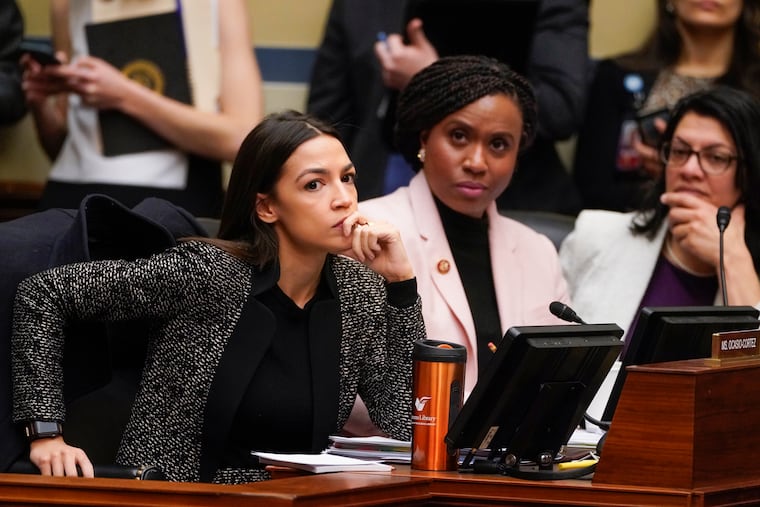In defense of my — and Alexandria Ocasio-Cortez’s — ‘Latina thing’ | Helen Ubiñas
That “Latina thing” is fighting for those that the Trump administration aims to marginalize and erase.

Whatever comes from the secret Mueller report, which did not — I repeat, did not — fully exonerate President Donald Trump, this much I know for sure: It won’t do a damn thing for the rot that has set into our country, the kind where a president can declare war on a free press while weaponizing lies and provoking hate, and can declare a made-up national emergency over immigrants seeking refuge instead of tackling head-on this country’s true national emergency.
You all know what it is without me having to say it: the epidemic of gun violence and its aftermath that has been breaking hearts while the president and his supporters take their victory laps.
Last week, a year after the Parkland, Fla., school massacre, two students took their own lives. On Monday, the father of a 6-year-old girl shot to death in her Newtown, Conn., school was found dead, another apparent suicide. In Philadelphia, more than 70 people have been shot and killed so far this year.
Thoughts and prayers, at least? Nah. The president of the United States was too busy tweeting about his “Complete and Total EXONERATION.”
This is one of those post-Trump weeks when as a columnist I’m torn between jumping into the national fray, which is so deftly handled by the likes of Margaret Sullivan and Will Bunch, and using my platform as a metro columnist to amplify the local stories and voices of the very people Trump and his administration aim to erase.
Immigrants.
LGBTQ people.
Women. People of color.
Specifically, women of color, who seem to really irk the administration and its supporters when they not only dare claim their space but use it to call BS.
Take Alexandria Ocasio-Cortez, a favorite target of Republicans.
Last week, Fox’s Laura Ingraham and her guest Joe DiGenova, desperate to find new ways to mock a politician who terrifies them, tried to make fun of Ocasio-Cortez for how she pronounces her name.
DiGenova, who was once in the running to be Trump’s lawyer: “She does the Latina thing … ,” he said, which is apparently what we’re calling having the audacity to pronounce our own names correctly.
In her usual way, AOC wasted no time swatting away the nonsense and getting back to work. That’s what women of color have to do, on the regular.
“If by ‘the Latina thing,’ she means I actually do the work instead of just talk about it, then yeah, I’m doing ‘the Latina thing,' ” she tweeted.
In the realm of all awful things said in these hate-fueled times, it wasn’t the worst thing said about her or any of the people the president and his supporters routinely dismiss and discriminate against. When they go as low as you think they can, they find a new low.
Except that for me, for some obvious and not so obvious reasons, this one cut extra deep.
The morning after the racist mocking, I was giving an on-camera interview where I needed to identify myself, and I found myself tripping over my own name. Again. Saying my name is always tricky, and not just because my name has proven hard for others to pronounce. I struggled to embrace the ethnicity that made my family targets of discrimination and bigotry, and that we sometimes hid. I’ve written about it. It wasn’t pretty, or easy.
It still isn’t.
Do I say Yoo-bin-iss – the way Anglos are likely to pronounce the name Ubiñas? Or do I say Ooh-veen-yass, the way the name is actually pronounced, tilde and all?
The latter is correct. I fought long and hard for that tilde, causing a minor uproar at my old newspaper when in 2003 I demanded to use it after years of being told they didn’t have the technical capability to use accents. They figured it out.
For me, it’s not just about calling people by their actual names; I still find myself using both pronunciations interchangeably. That’s my choice. It’s about seeking out those who might be marginalized or erased because of their last name or the color of their skin or whom they happen to love or pray to, and telling them that you see them. And using whatever platform you have to make sure others see them, too.
So, for now, I’ll leave the Mueller report tea-leaf reading to others while I plan for my next pop-up newsroom at a program that gives clothes to people in need across the city, and while I hang out with a man, a Puerto Rican man, who cleans up his North Philadelphia neighborhood parks on his own time, and while I talk to a local Mexican photographer about the people she documented at the Mexican border last year, while I’m over here, you know, doing my Latina thing.